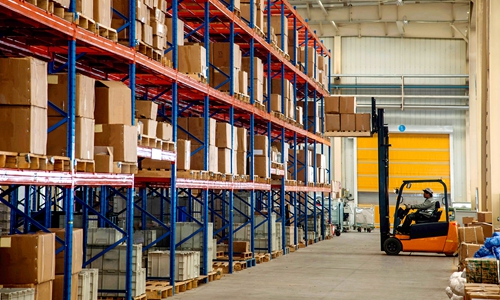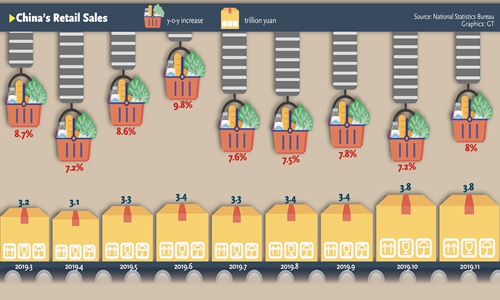HOME >> SOURCE
Foreign retailers lured by China's huge consumption power
By Li Xuanmin in Beijing and Xie Jun in Shanghai Source:Global Times Published: 2020/1/2 20:23:43
Companies’ long-term ability to generate profits hinges on political relations: analysts

Photo: VCG
From UK luxury department store Harrods to Canadian iconic winter clothing manufacturer Canada Goose and US supermarket giant Costco, foreign retailers see no sign of scaling back in China despite some being caught in the crossfire of strained relations.
China's ongoing consumption upgrade, paired with the nation's commitment to opening-up, is creating a sizzling consumer market that no foreign company would dare to miss.
Retailers' ambitious expansions are also a vivid display of how China remains a magnet to foreign investment as its doors open wider.
In January 2019, Canada Goose opened its first store in Beijing's Sanlitun shopping mall. Sales of its down jackets are still hot in China after almost a year, with long lines to enter the shop a common event.
The Global Times saw that about 50 consumers waited outside the store on a chilly Saturday night. A sales assistant told the Global Times that at peak hours, more than 100 consumers could line up and it sometimes took more than half an hour for them to enter.
"As winter arrives, our sales of down jackets hit 2,000 a day over the weekend. Even on workdays, about 1,000 jackets are sold every day," the sales assistant said.
A Canada Goose down jacket in China costs about 8,000 yuan ($1,148.72) to 10,000 yuan. Some popular looks, like the Expenditure line, have been sold out despite restocking regularly.
A 30-something customer who bought a Parker down jacket at the store told the Global Times that she paid about one-third of her monthly salary. "Many of my friends and colleagues are wearing Canada Goose… so it's necessary spending because I need to jump on the bandwagon."
In November, Canada Goose opened a new store in Shanghai, its fifth in China. The luxury coat maker got cold feet when delaying the first opening in Beijing, shortly after Canada's arrest of Huawei's Chief Financial Officer Meng Wanzhou, which inflated widespread anger among Chinese people.
Political ties between China and Canada soured since then, yet that hasn't stopped the Canadian brand from deepening its footprint in a massive market that is home to about 400 million middle-class people.
The country, underpinned by a robust economy, is undergoing a consumption upgrade trend, where immense consumption power is being unleashed. That's the key reason why foreign investors enter China, even amid stalemated political relations, observers said.
Some also open shops directly in China in the hope that they could mitigate risks against fluctuations in goods trade brought by strained bilateral relations.
Similar to Canada Goose, US supermarket chain Costco also made forays into China in August, at a time when the world's two largest economies had been embroiled in an escalating trade war.
As some Chinese consumers distinguish politics from economic activities, the madness on the opening day has not died down and the US retailer still sees shopping fever among Chinese consumers, some of whom have developed a certain degree of loyalty to the US supermarket.
Around noon on Friday, the Global Times saw that the Costco store was quite crowded especially in the food sector. Customers waited in long lines to purchase two of its hot-selling goods: the rotisserie chicken and fresh croissants.
One middle-aged customer surnamed Dai, who drove 40 minutes from her home to the supermarket, said she had waited nearly 50 minutes for her turn to buy the chicken. "I come once or twice every month to shop for daily items, particularly food. Some products, like the chicken, are worth buying for their cheap price and value for money," she said.
A Costco PR representative told the Global Times that the supermarket's customer flow has stabilized at a relatively high level compared with the opening but is "still busy in general."

Graphics: GT
Vote of confidence
The new year also saw a head start for China in attracting more foreign investors. In recent days, UK department store Harrods announced that it will open a store in Shanghai in 2020, marking the first stand-alone site in China and also the first the retailer will open outside the UK.
Analysts said that foreign retailers' moves are a vote of confidence in China's pledges to open up further and create a level playing field for all companies.
"The year of 2019 was a remarkable year when the speed of opening up accelerated. That's why more foreign services firms rush in, in addition to traditional industries such as manufacturing," Bai Ming, deputy director of the Ministry of Commerce's International Market Research Institute, told the Global Times. "The growth streak will continue in the new year."
But Bai said that the massive market in China is not up for grabs for anyone.
"Foreign investors' ability to generate continuous profits from China still hinges on their home countries' long-term bilateral relations with China. If political relations warm up, their products will be more broadly welcomed by Chinese consumers," Bai added.
Newspaper headline: Foreign retailers rush to China